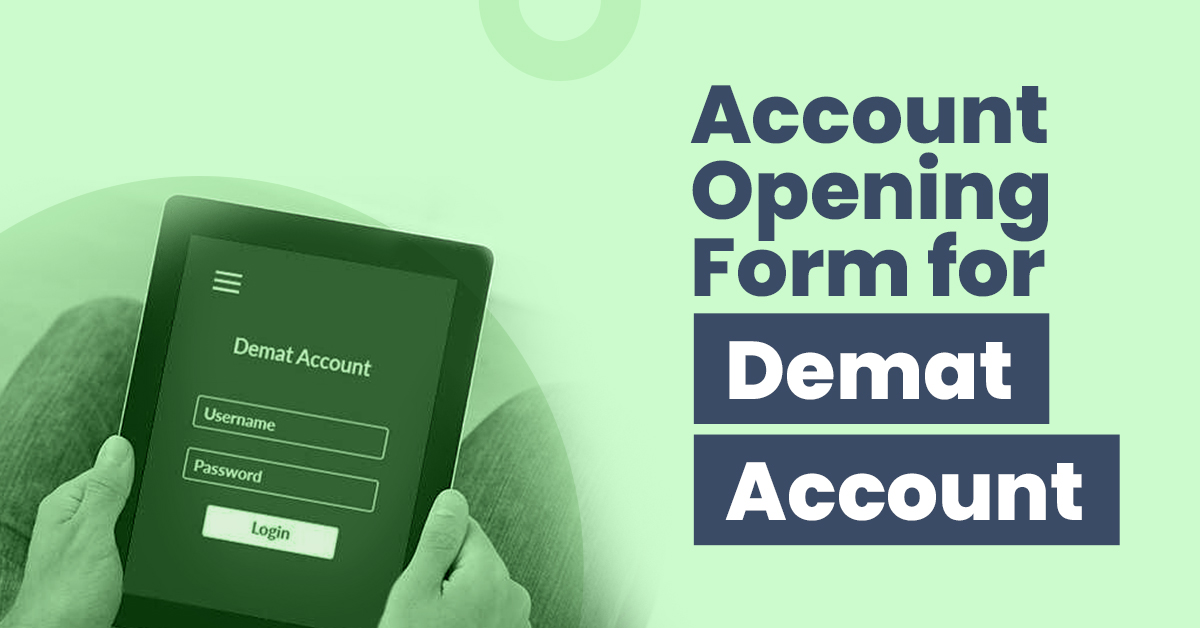Everything You Need to Know about the Demat Account Opening Form


Technology has enabled investors to open a Demat or dematerialised account online through a depository participant (DP). However, not everyone is technologically versed, so one may opt to register for a Demat account via offline mode.
However, before you opt for a Demat account via offline mode, understand that you will need to physically visit the broker’s branch with all the necessary documents, which will be required to fill out the account opening form. Therefore, read on to ensure that you don’t miss out on any documents and proceed through the form-filling process seamlessly.
What documents are required for opening a Demat account?
Identity proof
You may present your Aadhaar card, voter ID card, or driving licence to support your identity. Submitting the PAN Card is mandatory. You can also submit any Central or State Government-authorised identity card with your photograph as ID proof.
Address proof
You may consider your rent agreement, utility bill including electricity, gas, telephone, etc., passport, driving licence, voter ID card or any other government-issued ID mentioning your address to support your residence.
Income proof
To present your income proof, you may submit the any of the following documents including last 3 months’ salary slips, net-worth certificate issued by a Chartered Accountant, an Income Tax Return copy or the previous 6 month’s bank account statement.
Bank account details
You can easily present your bank details via bank account statement, passbook, cancelled cheque, or any official bank document mentioning your name, account number and IFSC code.
Lastly, remember to carry your PAN card, passport-sized photographs and an attested copy of every document you submit to open a Demat account.
What is the Demat account opening form?
Now that you have prepared the required documents, let’s learn how to fill out the Demat account opening form. Of course, the first thing you will need to do is get a hold of the registration form. You can do so by visiting your nearest branch of the broker or simply download the online form on their website.
To open a Demat account, you will be required to fill out 3 forms: a registration form, a nomination form and a KYC form. A registration form initiates an application for a Demat account, whereas a nomination form specifies the nominee of the account in case of account holder’s demise. A “Know Your Customer” (KYC) form helps to have updated data of customers.
How to apply for a Demat account online?
Applying for a Demat account online is way faster and hassle-free than the offline mode. It follows a similar process as an offline registration mode, except it eliminates the effort and paperwork.
To open a Demat account online, you will need to go to the website of a brokerage firm and fill out the account opening form online. It includes entering and uploading all your details and the required documents.
The only difference is you will have to upload an e-signature either by uploading a picture of your handwritten signature or by directly signing through a smartphone depending on your DP.
Furthermore, you may also avail of remote KYC verification by uploading your video or by an in-person visit by an official, depending on the broker’s policy.
Final Words
Filling out a Demat opening form is a particular task, and any error may lead to rejection or failure. Therefore, you diligently fill out the Demat account opening form. Even the representative of the broker at the nearest branch will help you in this regard.
Frequently Asked Questions (FAQs)
Do I need to apply for both Demat and trading accounts?
Generally, DPs provide both Demat and trading accounts together. So you do not need to apply for them separately. However, if you do, you will need to link them to buy and sell securities.
How is a trading account different from a Demat account?
A Demat account is safe and regulated storage for your securities. However, a trading account acts as an intermediary between an investor and their bank account and helps to buy or sell securities.
Is a Demat account taxable?
The earnings generated by selling your securities stored in a Demat account are taxable. For equity investments, the tax rate for STCG (Short-Term Capital Gains) is 15%, but LTCG (Long-Term Capital Gains) exceeding ₹1 lakh are subject to a 10% tax. For non-equity assets, taxation of STCG is added to the investor’s income and is taxed as per their individual tax slab, while LTCG is subject to a 20% tax with indexation benefit.
Can a minor have a Demat account in their name?
Yes, SEBI has not specified any age limit to open a Demat account. So, it is perfectly legal for a minor to own a Demat account. However, they cannot own a trading account, and as a result of which, their Demat account system has to be regulated by a legal guardian.







